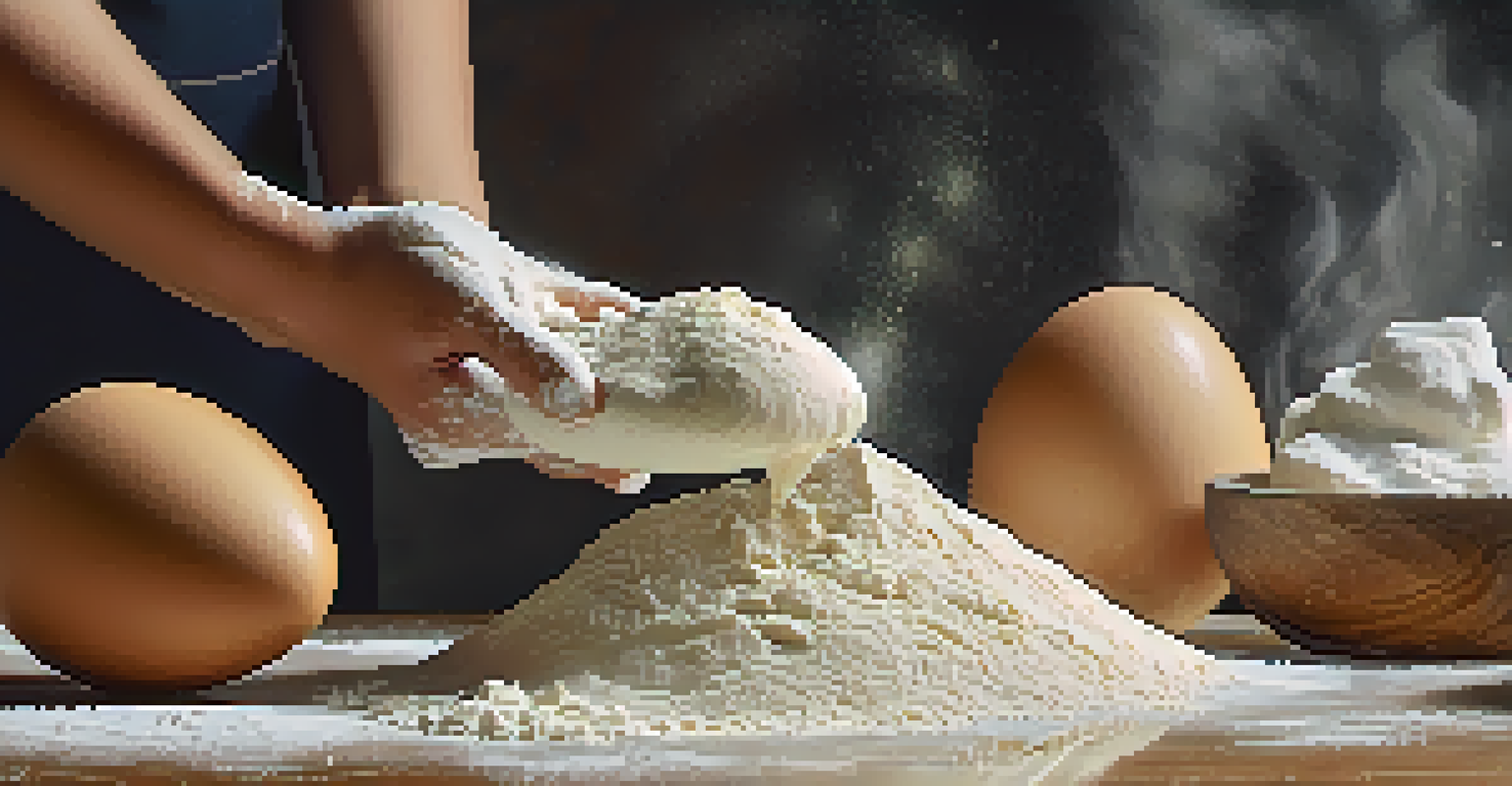The Role of Cooking in Stress Management and Well-being

Cooking as a Mindful Activity for Stress Relief
Cooking can be a form of mindfulness, allowing us to focus on the present moment. As we chop vegetables or stir a pot, our minds can break away from the stressors of daily life. This simple act of concentration helps ground us, creating a soothing routine that can alleviate anxiety.
Cooking is like love. It should be entered into with abandon or not at all.
When we engage in cooking, we often find ourselves immersed in the sensory experience—the smell of garlic sizzling, the vibrant colors of fresh produce, and the rhythmic sounds of chopping. These sensory elements can be incredibly calming, making cooking a perfect antidote to stress.
Additionally, the repetitive motions involved in cooking can have a meditative quality, which further enhances our sense of peace. By dedicating time to this nourishing practice, we create a mental space that fosters relaxation and well-being.
The Joy of Creating: Cooking as a Form of Expression
Cooking allows for creative expression, much like painting or writing. When we experiment with flavors and combine ingredients, we express our individuality and emotions. This creative outlet can be particularly fulfilling, providing a sense of accomplishment and joy.

Moreover, cooking can be a playful experience—trying new recipes or inventing our own can spark excitement. This playfulness shifts our focus from stressors to the joy of creation, allowing us to escape from our worries for a while.
Cooking as Mindfulness for Stress Relief
Engaging in cooking helps ground us in the present moment, providing a soothing routine that alleviates anxiety.
Sharing our culinary creations with friends and family further amplifies this joy. The act of cooking for others can strengthen relationships and deepen connections, promoting overall well-being while enhancing our happiness.
Cooking and the Therapeutic Benefits of Routine
Establishing a cooking routine can provide structure to our daily lives, which is particularly beneficial during stressful times. Knowing that we have designated times to prepare meals can bring a sense of normalcy and predictability amidst chaos.
The act of cooking is a way to connect with yourself and with others, to express love and creativity.
This routine not only helps in managing stress but also encourages healthier eating habits. Consistently preparing meals at home allows us to make more mindful food choices, which can positively impact our physical health and, in turn, our mental well-being.
Furthermore, the predictability of a cooking routine can also foster a sense of control. In a world where many things feel uncertain, having this aspect of our lives organized can significantly reduce anxiety and promote a feeling of stability.
Cooking as a Social Activity to Combat Loneliness
Cooking can serve as a wonderful opportunity for social interaction, helping to combat feelings of loneliness. Whether it’s hosting a dinner party or cooking with family, these shared experiences foster connection and community.
Involving others in the cooking process can also make it more enjoyable and less of a chore. Sharing kitchen responsibilities not only lightens the load but also creates bonding moments filled with laughter and conversation.
Cooking Fosters Social Connections
Shared cooking experiences can combat loneliness and strengthen relationships, enhancing overall mental well-being.
These social interactions help to reinforce our support systems. By connecting with others while cooking, we can alleviate feelings of isolation and boost our overall mood, contributing to better mental health.
The Satisfaction of Homemade Meals and Accomplishment
There’s a unique satisfaction that comes from cooking a meal from scratch. The process of transforming raw ingredients into a delicious dish can provide a sense of accomplishment that many find fulfilling.
This feeling of achievement can be particularly uplifting when we’re feeling overwhelmed. Each successful meal serves as a reminder of our capabilities, boosting our self-esteem and resilience.
Moreover, enjoying the fruits of our labor—sitting down to a meal we’ve prepared—can be a rewarding experience. This moment of pleasure reinforces the positive effects of cooking on our overall well-being.
Nourishing the Body and Mind Through Cooking
Cooking at home allows us to choose wholesome ingredients, promoting better physical health. When we nourish our bodies with nutritious meals, we also support our mental health, as there is a strong connection between the two.
Eating well-balanced meals can lead to improved mood and energy levels. This, in turn, helps us cope better with stress and enhances our overall well-being, creating a positive feedback loop.
Homemade Meals Boost Self-Esteem
The satisfaction of preparing meals from scratch reinforces our sense of accomplishment and contributes to improved mental health.
Furthermore, the act of cooking itself can be a reminder to care for ourselves. By prioritizing meal preparation, we send a message to our minds that we are worth the effort, which can significantly boost self-worth and reduce stress.
The Importance of Cooking in Building Healthy Habits
Cooking regularly can help instill healthy habits that benefit our mental and physical health. When we make a habit of preparing meals at home, we naturally become more aware of our food choices and their impact on our health.
These healthy habits can extend beyond just cooking. As we become more engaged in our food preparation, we might also begin to prioritize other aspects of self-care, such as exercising and getting enough sleep.

Ultimately, the act of cooking can inspire a holistic approach to well-being. It encourages us to take an active role in our health and happiness, making it a vital part of stress management.
Conclusion: Cooking as a Lifeline for Mental Wellness
In conclusion, cooking offers a multitude of benefits that can significantly aid in stress management and promote overall well-being. From the mindfulness of the cooking process to the joy of sharing meals, this activity has a unique way of nurturing both body and mind.
As we explore new recipes, establish routines, and connect with others, we not only enhance our culinary skills but also improve our mental health. Cooking can truly be a lifeline, helping us navigate life's challenges with greater ease and resilience.
So, the next time you feel overwhelmed, consider stepping into the kitchen. You might just find that cooking is more than just a necessity; it’s a pathway to a healthier, more balanced life.